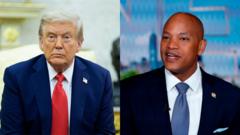In a recent social media post, President Donald Trump threatened to send National Guard troops to Baltimore, intensifying his ongoing conflict with Governor Wes Moore, a Democrat. This assertion came after Moore invited Trump to participate in a "safety walk" to address issues of crime within the city. Trump responded to the invitation, suggesting that if the governor required assistance similar to that provided in Los Angeles, he would act soon to "clean up the crime."
This sharp exchange emphasizes the growing tensions between the Republican administration and Democratic leaders over crime control strategies in urban areas. Governor Moore rebuffed Trump’s remarks, labeling them as "tone deaf" and lacking understanding of the real conditions in Baltimore, stating, “They have not been in our communities, and they are more than happy to keep making these repeated tropes about us.”
Only recently, Trump has mobilized approximately 2,000 troops to Washington D.C., asserting that the deployment has successfully restored safety to the city, which he described as a "hellhole" prior to the National Guard's presence. Trump’s administration claims that arrests have surged as a result of the troop presence. However, the Pentagon clarified that those soldiers, previously unarmed, would be armed moving forward, even though they have been stationed away from direct law enforcement duties.
The legitimacy of deploying military forces for domestic purposes has faced stern criticism from various political figures. Several Democratic leaders, including Illinois Governor JB Pritzker and House Minority Leader Hakeem Jeffries, have denounced Trump's plans as an "abuse of power" and raised legal concerns about his authority to send troops to cities such as Baltimore and Chicago.
Recent data from the Metropolitan Police Department in Washington D.C. indicate a decline in violent crime rates, which have reportedly reached their lowest in three decades. This contradicts Trump's claims of rampant crime and suggests that his call for federally armed intervention may be unnecessary.
Furthermore, a recent poll conducted by the Washington Post and Schar School revealed that almost 80% of Baltimore residents oppose the federal troop deployment, highlighting a significant disconnect between the Trump administration's stance and public sentiment in urban areas. Ultimately, Trump's threats to deploy the National Guard appear more like an escalation of political tensions than a practical response to genuine safety concerns.
This sharp exchange emphasizes the growing tensions between the Republican administration and Democratic leaders over crime control strategies in urban areas. Governor Moore rebuffed Trump’s remarks, labeling them as "tone deaf" and lacking understanding of the real conditions in Baltimore, stating, “They have not been in our communities, and they are more than happy to keep making these repeated tropes about us.”
Only recently, Trump has mobilized approximately 2,000 troops to Washington D.C., asserting that the deployment has successfully restored safety to the city, which he described as a "hellhole" prior to the National Guard's presence. Trump’s administration claims that arrests have surged as a result of the troop presence. However, the Pentagon clarified that those soldiers, previously unarmed, would be armed moving forward, even though they have been stationed away from direct law enforcement duties.
The legitimacy of deploying military forces for domestic purposes has faced stern criticism from various political figures. Several Democratic leaders, including Illinois Governor JB Pritzker and House Minority Leader Hakeem Jeffries, have denounced Trump's plans as an "abuse of power" and raised legal concerns about his authority to send troops to cities such as Baltimore and Chicago.
Recent data from the Metropolitan Police Department in Washington D.C. indicate a decline in violent crime rates, which have reportedly reached their lowest in three decades. This contradicts Trump's claims of rampant crime and suggests that his call for federally armed intervention may be unnecessary.
Furthermore, a recent poll conducted by the Washington Post and Schar School revealed that almost 80% of Baltimore residents oppose the federal troop deployment, highlighting a significant disconnect between the Trump administration's stance and public sentiment in urban areas. Ultimately, Trump's threats to deploy the National Guard appear more like an escalation of political tensions than a practical response to genuine safety concerns.




















